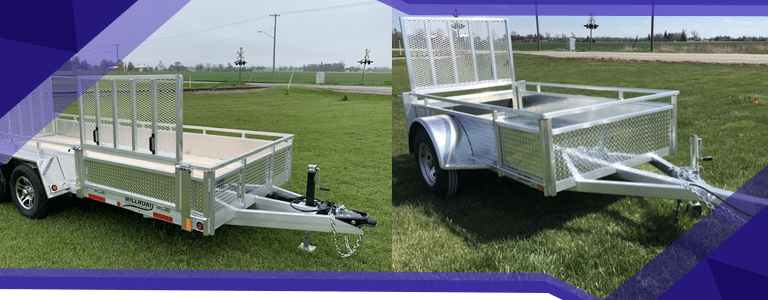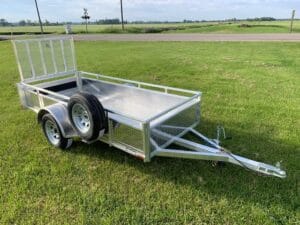
July 28, 2020 Last updated on June 16, 2023 by Bob Fisher Bob Fisher Landscape Trailers
The tires on your aluminum landscape trailer aren’t exactly the same as the tires on your truck. Passenger vehicle tires operate a little differently. Trailer tires are designed to carry loads, not people. Taking care of your landscape trailer tires makes them last longer to save you money. Here are five common questions people have about trailer tires.

The quick answer is no. The why behind the answer is that passenger vehicle tires are balanced to provide a smoother ride for the people in the vehicle and for better treadwear. You can certainly have your trailer tires balanced if you prefer, but you don’t need to.
Special trailer tires are designed to support the vertical load on a trailer. Passenger tires are made for steering and passenger comfort. ST tires are narrower with shallow grooves. The stiffer sidewalls ensure that they can carry more weight. You shouldn’t swap out tires for different uses because they weren’t made for the same purpose. Light truck tires are often used for larger trailers or fifth wheels because they have higher speed ratings. If you use LT tires on your trailer, make sure they’re the right capacity for your load.
Typically, you should stick with ST tires for your trailer.
Most tires on your trailer won’t wear evenly. The inside tires wear differently because when turning, they have less road to travel. However, your tires shouldn’t have significant tread differences unless:
Trailer tires that wear more heavily on the inside generally indicate that you’re overloading your trailer. If the outer tread is wearing faster, the trailer may be under-loaded. If you’re seeing treadwear on one side only, it might be a suspension problem.
Trailer tires are designed to last three to six years, but it really depends on the quality of the tires and how you treat them. You probably won’t need to replace your tires from treadwear as you would with a passenger tire. More likely, trailer tires deteriorate from a lack of use. Between jobs, you may park your trailer in one place, which causes the bottom to wear out. The top of the tire soaks up harmful UV rays. Oxidation can also cause the tire to decay early.
To see how old your tires are, look at the sidewall for the DOT code. The last four numbers of the code tell you when the tire was built. For example, 0519 means that the tire was manufactured in the fifth week of 2019.
A tire is rated B, C, D or E to determine load range. For tires that are the same size with different load ranges, the higher letter will generally indicate a higher load range. Choose tires that have the same load range as the trailer because other components of the trailer also have weight limits. You may be stressing the trailer too much by using tires that aren’t designed for it. Tires with higher load limits will generally cost more.
Millroad landscape trailers are made out of aluminum and won’t rust in the elements. You’ll still need to take care of your tires, but you can store your trailer inside or outside without worrying about water damaging the trailer. Learn more about our custom trailers to find out which one fits your needs.